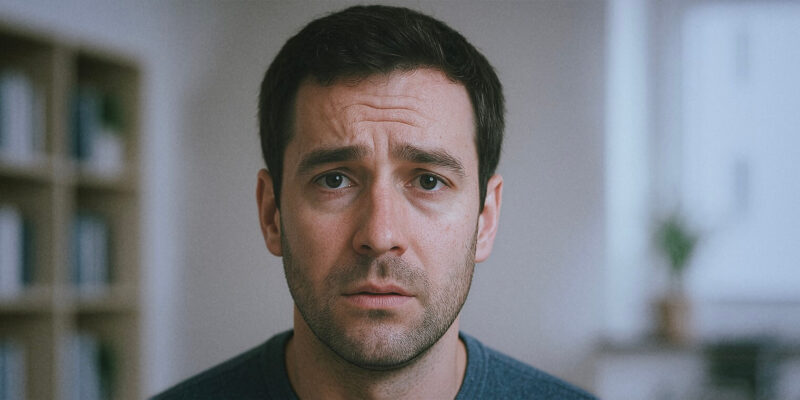Many people are a lot more anxious than they’d like to admit.
This is understandable for a couple reasons…
- There’s a lot of shame and stigma associated with emotional health struggles like anxiety. Acknowledging your anxiety honestly can lead to a lot of shame and guilt if you believe that it’s not okay to be anxious.
- It’s hard to accept a struggle if you don’t have a good way to deal with it. Many people get in the habit of ignoring and discounting their anxiety because the “solutions” they’ve tried in the past haven’t worked, and as a result, they feel hopeless about it.
Still, the longer you ignore this hidden anxiety the worse it becomes. And at some point, it’s likely to start wreaking havoc in your daily life…
Chronic stress and overwhelm, insomnia, relationship conflict, difficulty focusing, and depression, for example, can all be caused by unacknowledged anxiety.
In the rest of this article, I’m going to walk through four signs that you might be more anxious than you think.
If you can identify these signs of hidden anxiety, and then use them to become more aware of anxiety in your life, you’ll be well-positioned to start dealing with the anxiety in a healthy and productive way.
1. Constant busyness
Constant busyness is the habit of keeping yourself perpetually occupied with tasks and to-dos.
For many people, this is a defense mechanism to avoid having to acknowledge and deal with an emotional difficulty like grief, anger, or in this case, anxiety.
For example:
- Anytime you’re driving, exercising, or doing housework, you always have on the radio, tv, or a podcast. In fact, it makes you uncomfortable to be in the car without the radio on or to lay in bed without the TV on.
- You spend more hours than you need to at work or doing work. Many people suffer from chronic stress and burnout because they don’t realize overworking is actually a coping mechanism for unacknowledged anxiety.
- Spending quiet alone time with yourself makes you nervous, so you have a habit of calling people “just to chat” whenever you have free time. Obviously chatting with friends isn’t necessarily a bad thing; but if the reason you’re doing it is to avoid difficult thoughts or feelings, that’s another thing entirely…
When you have a never-ending list of projects and things to do your mind is always turned outward and doesn’t need to reflect inward.
This can feel like a relief if your inner world is full of worries, fear, and anxieties.
But ultimately, avoiding those difficult thoughts and emotions isn’t addressing them. And in fact, the more you avoid them, the stronger they become—which then means the more busy and distracted you have to keep yourself.
Eventually, your life becomes so busy and overfilled that you’re not only constantly stressed and burnt out, but you also miss out on much of life…
- Spending quality time playing with your grandkids
- Having room to play and be adventurous with your spouse
- The capacity to be genuinely empathetic and available for good friends in a time of need (you can’t be available—logistically or emotionally—if you’re constantly busy)
When you spend your whole life staying busy to avoid your anxiety, you end up missing out on all the most important things in life.
If “constant business” seems like a label that might apply to you, ask yourself this question: Am I so busy because I have to be? Or am I using busyness to avoid something inside myself?
We tediously create calendars filled with empty duties, and then we foolishly let those calendars empty us.
― Craig Lounsbrough
2. Trying to find meaning in everything
Whenever I hear someone say, “I believe everything happens for a reason” it always makes me wonder…
Are they expressing a carefully examined philosophical belief about the nature of reality? Or are they trying to make themselves feel better?
9 times out of 10 I think it’s the latter.
The need to find meaning in everything is usually a symptom of uncertainty anxiety.
For example: A disturbing thought about being violent to someone you love pops into mind. Your immediate reaction is to start wondering what it means about you and your psychological state. You’re assuming the thought means something about you when, in reality, there’s a very good chance it’s random and meaningless.
Uncertainty anxiety means you’re so terrified of uncertainty that you live in denial about it by assuming everything means something.
The problem is, the more you avoid the anxiety of uncertainty by reading meaning into everything, the more terrified of anxiety you become. And once you develop anxiety about anxiety, you’re in real trouble.
The only way to lower your anxiety in the long-run is to be willing to have it.
Life is full of uncertainty. And uncertainty is scary. But running and hiding from the fear of uncertainty behind false narratives about meaning only compounds the problem.
On the other hand, when you drop compulsion of finding meaning in everything, you allow yourself to face up to your fears of uncertainty head on. And this is the only way to deal with uncertainty well—in a healthy, mature, and productive way.
Learn More: Face the Real Fear
You cannot swim for new horizons until you have courage to lose sight of the shore.
— William Faulkner
3. Black and white thinking
Black and white thinking means the tendency to think about things in unrealistically extreme categories.
For example:
- You make a mistake during your weekly softball game and afterward tell yourself: “I’m such a screw-up.” In this case, you’ve artificially created two categories for yourself as a softball player: Screw-up and successful. In reality, everyone is a messy combination of successes and screw-ups.
- You sit down to work on a new painting, but after procrastinating for 30 minutes on your phone, you tell yourself: “Who am I kidding… I can’t do this. I should leave art to the creatives.” Here you’ve artificially split the population into creatives and non-creatives. In reality, everyone is creative (or capable of being creative) in some ways. Even people we admire for their creativity struggle, and frequently people we don’t think of as creative surprise us with creative ideas or works.
Aside from being a generally unhelpful form of negative self-talk, black and white thinking is often a sign of chronic underlying anxiety because—like finding meaning in everything—it’s an unhealthy defense mechanism against uncertainty.
It’s simpler and easier to think about the world in terms of good vs bad, creative vs non-creative, athletes vs non-athletes, etc.
But when you acknowledge that reality is almost always far messier and more complex that it seems, that leads to two anxiety-producing realizations:
- There are a lot of things I don’t know. To sincerely face-up to our own ignorance is a painful thing, especially if it conflicts with preexisting beliefs, assumptions, or world-views.
- It means you have to put in some work. If the world is made up of creatives and non-creatives, and I struggle to be creative, that means I’m relieved of the pressure of having to put in the time and hard work required to be creative.
Splitting the world into black and white makes things seem simpler, easier, and less scary than they really are.
But like most forms of denial, it doesn’t work in the long-run…
- Other people, for example, tend to resent being put into artificially binary categories. So if you’re in the habit of talking about your spouse in black and white terms, a lot of resentment and conflict is likely to emerge in your relationship.
- Or take the example of labeling yourself as “not creative.” The more you tell yourself the story that you’re not creative, the more you’re going to avoid opportunities for creativity. But if deep down you really value creativity expression, you’re going to amass a tremendous amount of inner tension and conflict which is likely to come out in some pretty negative forms like depression, somatic symptoms, chronic stress, etc.
Life is messy. People are especially messy. Insisting that everything fall into neat and tidy categories might make you feel better in the moment but it’s fragelizing you and your relationships in the long-run.
Learn More: 7 Types of Self-Talk Making You Unhappy
In an era of stress and anxiety, when the present seems unstable and the future unlikely, the natural response is to retreat and withdraw from reality, taking recourse either in fantasies of the future or in modified visions of a half-imagined past.
― Alan Moore
4. Procrastination
People who struggle with procrastination often think about it like this:
What’s causing my procrastination?
And while that can be helpful, here’s another way to look at it that’s likely much more helpful:
What need is my procrastination filling?
See, procrastination isn’t just some passive symptom of an underlying problem. Often procrastination is an active defense mechanism we use to avoid something unpleasant—like anxiety.
For example:
- You really need to clean out your spare bedroom because it’s overflowing with clutter, you can never find things you need, and it would be really nice to be able to actually use the spare bedroom and have guests come and stay.
- But every time you think about cleaning it out, a wave of dread comes over you. And because you feel so bad, you find yourself doing other things… scrolling social media, calling a friend, even cleaning up another room!
- What’s really going on here is that you have anxiety about cleaning the spare bedroom. And when you think about doing it, you are so intolerant of that anxiety, that you need procrastination to give you relief from it. In other words, procrastination is doing the job of helping you manage your anxiety about cleaning.
- But as you’re probably aware, you’re not really managing your anxiety in a productive way. In fact, you’re not really managing it so much as simply avoiding it.
If you struggle with chronic procrastination, instead of asking yourself what’s causing your procrastination, ask what job it’s doing.
If you’re using procrastination to avoid anxiety, you’re actually making that anxiety worse long-term because when your brain sees you chronically avoiding something it assumes that thing is dangerous—anxiety, in this case. Which means even though you get some temporary relief by avoiding it, that relief comes at the cost of even greater anxiety the next time around.
If you’re going to address your anxiety in a healthy and productive way (and finally stop procrastinating) you need to become more aware of your anxiety, not less.
You have to figure out what, really, is so anxiety-producing about, say, cleaning out the spare bedroom (maybe you’re actually afraid of having to entertain guests again because you’re embarrassed by your home or the neighborhood you live in?)
But to do that—to really understand your anxiety—you have to confront it and listen to it instead of just avoiding it.
Learn More: 3 Procrastination Tips Nobody Want to Hear
Procrastination is not Laziness… It is fear. Call it by its right name, and forgive yourself.
― Julia Cameron
All You Need to Know
Here are four subtle signs you might be more anxious than you realize:
- Constant busyness
- Trying to find meaning in everything
- Black and white thinking
- Procrastination





7 Comments
Add YoursThat was spot on. Very helpful.. thank you ????
it shows me how much i am anixious without even know, i really thank you for this amazing article
I don’t know how to get out of this vicious cycle. I am trapped.
I feel like I’ve wasted so much time avoiding ‘the elephant in the room’.
Still unsure how to deal with?
A post on the solution to these issues would be great
vagus nerve stimulation is a great place to start, rubbing behind your ears is one spot, the head, lying down on your right side to sleep, cold showers or exposure but safely always, and also acceptance to a degree that anxiety is a part of who you are and the less it is fought the more trouble it will cause. good luck
I love love love this article. So helpful for all the high functioning people out there.